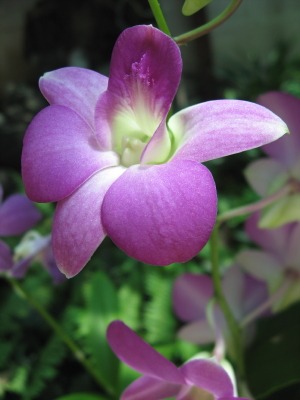Dendrobium Orchid Species and Hybrids
Dendrobium Orchid Care
Common names include Den, Spray Orchid, and Lei Orchid.
There are approximately 1,200 individual species, and they grow a variety of climates, from warm, damp lowlands to high-altitude, cold climate mountains.
Flowers can last anywhere from one day to several weeks, depending on the species.
Flower
Arching Sprays of flowers in yellow, white, red, and pink, many with
 contrasting throats, adorn this flower. Some are fragrant. Most bloom
in spring. To encourage a flower spike, slightly drop the water and
nighttime temperature.
contrasting throats, adorn this flower. Some are fragrant. Most bloom
in spring. To encourage a flower spike, slightly drop the water and
nighttime temperature. After the first flower bud opens, the sprays will stay in bloom over next 2 months. If the plant is kept in a bright warm spot, the plant may produce additional sprays of dendrobium flowers.
Don't cut it off canes that loose all of their leaves. Orchid flowers might still bloom from old canes. Dendrobium orchid blooms can last up to six weeks.
Dendrobium Orchid Care Tips
Lighting RequirementsBright Year Round
Temperature Requirements
In winter, cool (60° F / 16° C nights and days in the 75° F / 24° C range); in summer, intermediate (60° F / 16° C nights and days in the 75 – 80° F / 24° - 27° C range)
Humidity Requirements
Fifty to sixty percent humidity is ideal for dendrobium orchids. This can be provided by placing the orchid pot on a tray of gravel filled with a small amount of water or by placing a humidifier in the room or greenhouse.
Fertilizer
Feed dendrobiums during the active growing period. Feed every week at one quarter to one half of the recommended dilution. At the end of the growing season, reduce fertilizer by 1/2 to help encourage a better bloom.
Tip: To prevent and remove excess salts from potting soil, thoroughly flush with clear water every month.
Water
Allow soil to become almost dry between watering. Dendrobium orchids store water in their cane-like stems, and some species have pseudobulbs. Water dendrobiums approximately once or twice a week. During the summer, the plants may need to be watered every 4-5 days.
Soil
Orchid Bark Mix
Propagation
Propagate from aerial cuttings taken from mature orchids. Cut off the tip, below where you see several aerial roots emerging. Pot the cutting.
Repotting
- Cover a flat work space with butcher paper or newspaper. To loosen the orchid, tap the pot gently or slide a knife between the soil and the pot.
- Tilt the orchid pot sideways and gently remove the plant from the pot and lay it on the work surface.
- Remove as much of the potting mix from the orchid roots as possible.
- Spit the orchid plant into two separate pieces by carefully pulling apart the plant by the roots, avoiding splitting the stems of the plant. This promotes new growth.
- Fill two separate flower pots 1/3 of the way full with tree bark. Place each orchid half into each pot. Pour more tree bark around the root system of the orchids. The bark should reach the base of the orchid stems.
- Water the dendrobiums at their roots until the bark is moist to the touch.
Longetivity
Dendrobium orchids can last many years.
Selection
D. loddigessi are fragrant and produce peach colored flowers. Wonder Nishii (atroviolaceum X alexandrae ) has sugar scented yellow flowers marked with deep maroon. It blooms several times a year on old and new canes.
Uses and Display Tips
Tall, staked varieties can be displayed on a sunny windowsill. Dwarf varieties can be displayed in hanging baskets.
Other Types of Orhcids
| Cattleya Orchids - Large Stunning Blooms |
| Cymbidium Orchids - Long-Lasting Flowers |
| Oncidium Orchid - Colorful Exotic Blooms |
| Paphiopedilum Orchid - Slipper-Shaped Flowers |
| Phalaenopsis Orchid - Elegant Long-Lasting Flowers |





